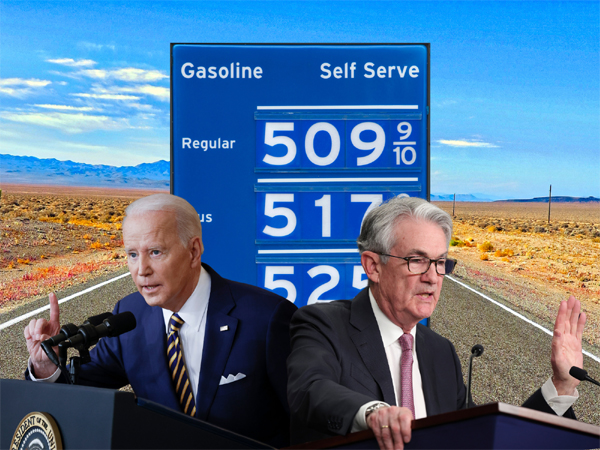By Liam Denning

A three-month federal tax holiday on gasoline won’t do much of anything. Which is about the best thing that can be said of it.
It won’t offer much relief for drivers. Say you have a fairly typical crossover SUV with a 14-gallon tank. When President Joe Biden took office, filling it at the average pump price of about $2.50 a gallon cost almost $35. Today, it costs more than $71. Paring off the 18.4-cent-per-gallon federal tax would save all of $2.58. The cost of filling your tank since Biden was sworn in would go from having slightly more than doubled to having merely doubled. Relief?
To put that in a different perspective, the White House claims the tax holiday would cost roughly $3.3 billion a month. Cutting that from the nation’s monthly fuel bill would imply that gasoline’s share of disposable personal income would fall from 2.42% to 2.40%.(1) How’s that for a midterm campaign bumper sticker? When Biden took office, the share was 1.29% — mainly because of the giant, road-clearing pandemic that got going the year before, but still.
The good news is that, if the tax holiday does little for wallets, it also won’t encourage much greater gasoline demand. Yes, economics dictates that any relief from price increases supports consumption. At the extreme margin, that $2.58 saving per tank might persuade a driver to fill up completely. But will many drivers really look at $69 versus $71 and fist-pump with one hand while they squeeze the pump handle with the other? Beware those who mock the gasoline tax holiday for doing nothing for Americans and simultaneously claiming it will have us all filling our bathtubs with the stuff.
That could change if states also suspend their own gasoline taxes, as the White House called for. A state-tax holiday would, on average, roughly triple our theoretical driver’s saving to almost $7 per tank. That would be meaningful — and would therefore unhelpfully blunt the price signal to conserve rather than consume.
Biden covered his bases by saying that, to make up the cost of the tax holiday, other federal money could be redirected into the federal Highway Trust Fund. This adds to the sense of farce, since the fund hasn’t met its costs through fuel duties in more than a decade, relying instead on regular infusions of other money such as was earmarked in last year’s infrastructure bill. How could it be otherwise given that the levy hasn’t been increased in almost 30 years? America’s dedication to avoiding transparency about all the external costs of driving, from repairing highway concrete to mitigating carbon dioxide emissions, is dogged.
Such inertia is why it is so hard to square energy security with decarbonization. This would require systemic change in infrastructure and behavior, fostered by proper incentives. Biden’s stalled Build Back Better package was an ambitious attempt. The best long-term solution to the dual quandary is to diversify energy sources and achieve meaningful conservation through efficiency and electrification, but these steps wouldn’t offer immediate gratification. Also, Biden can hardly be blamed for Russia’s invasion of Ukraine.
But as the clock ticks down to November, the air of desperation around energy prices is thickening, and White House actions and messages are becoming more erratic. Repeating the phrase “Putin’s Price Hike” is no substitute for an honest conversation about what standing up to Russia — which is necessary — really costs. Railing against oil majors will please some progressives but achieve little, especially when the administration is also trying to cajole the same companies to produce more.
Now this tax holiday proposal. It is symbolism, nothing more, not least because it relies on Congress acting. Biden is calling for lawmakers to do something, not doing anything himself. There is very little any president can do to meaningfully lower gasoline prices in the short term, and in any case, doing so blunts the painful but useful price signal to reduce demand. Pushing Congress to enact a tax holiday is the perfect distillation of decades of US non-policy when it comes to our strategic energy goals: The impotent calling on the dysfunctional to do something ineffectual.
_____________________________________________________________________
Liam Denning is a Bloomberg Opinion columnist covering energy, mining and commodities. He previously was editor of the Wall Street Journal’s Heard on the Street column and wrote for the Financial Times’ Lex column. He was also an investment banker. Energiesnet.com does not necessarily share these views.
Editor’s Note: This article was originally published by Bloomberg on June 22 , 2022. EnergiesNet.com reproduces this article in the interest of our readers. All comments posted and published on EnergiesNet.com, do not reflect either for or against the opinion expressed in the comment as an endorsement of EnergiesNet.com or Petroleumworld.
Use Notice: This site contains copyrighted material the use of which has not always been specifically authorized by the copyright owner. We are making such material available in our efforts to advance understanding of issues of socially, environmental and humanitarian significance. We believe this constitutes a ‘fair use’ of any such copyrighted material as provided for in section 107 of the US Copyright Law. In accordance with Title 17 U.S.C. Section 107. For more information go to: http://www.law.cornell.edu/uscode/17/107.shtml.
EnergiesNet.com 06 24 2022












